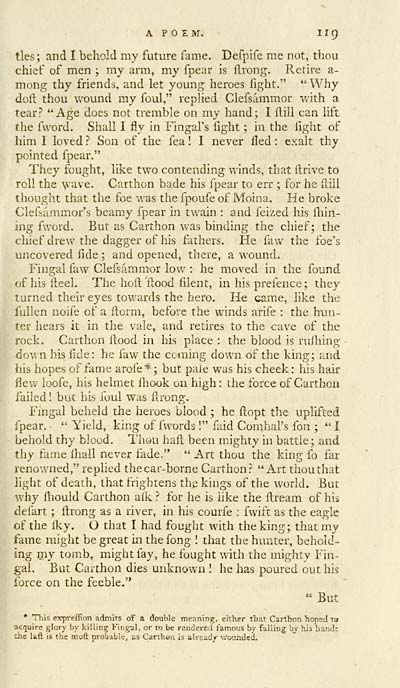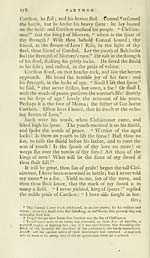Download files
Complete book:
Individual page:
Thumbnail gallery: Grid view | List view

A P Z M, 119
ties; and I behold my future fame. Defpife me not, thou
chief of men ; my arm, my fpear is llrong. Retire a-
mong thy friends, and let young heroes fight." "Why
doll thou wound my foul," replied Clefsammor v/ith a
tear? "Age does not tremble on my hand; I ftill can lift
the fvvord. Shall I fly in Fingal's fight ; in the fight of
him 1 loved ? Son of the fea I I never fled : exalt thy
pointed fpear."
They fought, like two contending winds, that ilrive to
roll the \vave. Carthon bade his fpear to err ; for he flill
thought that the foe was the fpoufe of Moina. He broke
Clefsammor's beamy fpear in twain : and feized his fliin-
ing fword. But as Carthon was binding the chief; the
chief drew the dagger of his fathers. He faw the foe's
uncovered fide ; and opened, there, a wound-
Fingal faw Clefsammor low : he moved in the found
of his Heel. The holl Hood filent, in his prefence ; they
turned their eyes towards the hero. He came, like the
fallen noife of a fl:orm, before the winds arife : the hun-
ter hears it in the vale, and retires to the cave of the
rock. Carthon flood in his place : the blood is rufliing
dov.n his fide: he faw the ccming down of the king; and
his hopes of fame arofe*; but pale was his cheek: his hair
flxcw loofe, his helmet fiiook on high: the force of Carthon
failed I but his foul was flrong,
Fm.gal beheld the heroes blood ; he ftopt the uplifted
fpear. " Yield, king of fwords I" faid Comhal's fon ; " I
behold thy blood. Thou hall been mighty in battle; and
thy fame fliall never fade." " Art thou the king fo far
renowned," rephed the car-borne Carthon? "Art tliouthat
light of death, that frightens the kings of the world. But
why fiiould Carthon alk ? for he is hke the ftream of his
defart ; flrong as a river, in his courfe : fwift as the eagle
of the Iky. O that I had fought with the king; that my
fame might be great in the fong I that the hunter, behold-
ing my tomb, might fay, he fought with the mighty Fin-
gal. But Carthon dies unknown I he has poured out his
force on the feeble."
" But
* This expreffion admits of a double meaning, either that Carthon hoped ta
acquire glory by killing Fingal, or to be rendered famous by falling bj his hand;
the laft is the moil pro'iabkj as Carthon is already %vounded.
ties; and I behold my future fame. Defpife me not, thou
chief of men ; my arm, my fpear is llrong. Retire a-
mong thy friends, and let young heroes fight." "Why
doll thou wound my foul," replied Clefsammor v/ith a
tear? "Age does not tremble on my hand; I ftill can lift
the fvvord. Shall I fly in Fingal's fight ; in the fight of
him 1 loved ? Son of the fea I I never fled : exalt thy
pointed fpear."
They fought, like two contending winds, that ilrive to
roll the \vave. Carthon bade his fpear to err ; for he flill
thought that the foe was the fpoufe of Moina. He broke
Clefsammor's beamy fpear in twain : and feized his fliin-
ing fword. But as Carthon was binding the chief; the
chief drew the dagger of his fathers. He faw the foe's
uncovered fide ; and opened, there, a wound-
Fingal faw Clefsammor low : he moved in the found
of his Heel. The holl Hood filent, in his prefence ; they
turned their eyes towards the hero. He came, like the
fallen noife of a fl:orm, before the winds arife : the hun-
ter hears it in the vale, and retires to the cave of the
rock. Carthon flood in his place : the blood is rufliing
dov.n his fide: he faw the ccming down of the king; and
his hopes of fame arofe*; but pale was his cheek: his hair
flxcw loofe, his helmet fiiook on high: the force of Carthon
failed I but his foul was flrong,
Fm.gal beheld the heroes blood ; he ftopt the uplifted
fpear. " Yield, king of fwords I" faid Comhal's fon ; " I
behold thy blood. Thou hall been mighty in battle; and
thy fame fliall never fade." " Art thou the king fo far
renowned," rephed the car-borne Carthon? "Art tliouthat
light of death, that frightens the kings of the world. But
why fiiould Carthon alk ? for he is hke the ftream of his
defart ; flrong as a river, in his courfe : fwift as the eagle
of the Iky. O that I had fought with the king; that my
fame might be great in the fong I that the hunter, behold-
ing my tomb, might fay, he fought with the mighty Fin-
gal. But Carthon dies unknown I he has poured out his
force on the feeble."
" But
* This expreffion admits of a double meaning, either that Carthon hoped ta
acquire glory by killing Fingal, or to be rendered famous by falling bj his hand;
the laft is the moil pro'iabkj as Carthon is already %vounded.
Set display mode to: Large image | Transcription
Images and transcriptions on this page, including medium image downloads, may be used under the Creative Commons Attribution 4.0 International Licence unless otherwise stated. ![]()
| Early Gaelic Book Collections > Ossian Collection > Poems of Ossian, the son of Fingal > (133) |
|---|
| Permanent URL | https://digital.nls.uk/77584239 |
|---|
| Description | Selected books from the Ossian Collection of 327 volumes, originally assembled by J. Norman Methven of Perth. Different editions and translations of James MacPherson's epic poem 'Ossian', some with a map of the 'Kingdom of Connor'. Also secondary material relating to Ossianic poetry and the Ossian controversy. |
|---|
| Description | Selected items from five 'Special and Named Printed Collections'. Includes books in Gaelic and other Celtic languages, works about the Gaels, their languages, literature, culture and history. |
|---|

